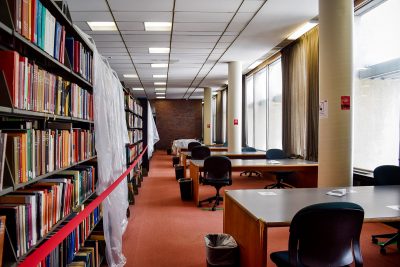
Boston University students can now reserve classrooms and other spaces in buildings across campus for personal uses, such as studying and attending online class, University leadership announced in an email Tuesday.
Students can make reservations either through an online portal — accessible through the BU Student Use Space App — or by scanning a QR code outside each study space, Dean of Students Kenneth Elmore said.
Each student will be allowed to book up to 600 minutes of study space per week and reservations can be made up to a week in advance, according to the email. Reminders will be sent to students in advance of each booking, and they will also be allowed to cancel if necessary.
Elmore said spaces will be available in several classroom buildings, as well as the George Sherman Union, Yawkey Center for Student Services and Mugar Memorial Library.
Elmore said most rooms have “COVID setups,” meaning they will include single spaces or three-person spaces. Students will also have to follow BU’s COVID-19 protocols — symptom attestation and testing, among others — at all times to be eligible for use of these spaces.
The motivation behind releasing the app was to make use of spaces that have been “underutilized,” Elmore said, and address the spatial issues that received less attention during planning for Fall.
“We did these things theoretically,” Elmore said. “We made the priority class space, but we soon found out that people were doing this hybrid thing where sometimes you take an in-person class, and then you have got to get right to your Zoom class. You need a place to go.”
Elmore added the University will not judge a student’s “intent” for choosing to use these study spaces.
Christine Paal, assistant vice president and university registrar, said the new study space reservation system is part of a multi-pronged solution for students this semester.
“We’re really looking holistically at the student experience,” Paal said. “What else can we do? What are their needs?”
Students are often doing a blend of remote and in-person coursework, Elmore said, and the University didn’t account for this in planning.
“That means that the space needs to change,” Elmore said, “We spent a lot of our time thinking primarily about classroom space. And now we see that we’ve got to do some other things.”
Originally created for the BU’s Medical Campus, Paal said the University expanded the app to the Charles River Campus to address student needs amid Learn from Anywhere. Though the first focus of administrators was classrooms, Paal said everyone recognized they had to address use of other spaces that affect students.
Paal said it is important to provide students with spaces as the weather gets colder and outdoor locations will soon become inconvenient to use.
All available spaces will be fully set up to follow school and state regulations for COVID-19, Paal said, but students will also have to be responsible with their use of the spaces.
“Part of it is the onus on the students to follow the rules,” Paal said, “and then on BU to have set up the space properly.”
Paal said the nature of the system makes it difficult for BU to firmly enforce rules. She compared it to the social contract of a grocery store, where customers must take responsibility for following the rules.
“I would guess the alternative would be to say, ‘Well, we can’t trust people, so we can’t have this service,’” Paal said. “It’s a matter of social contract and thus far, it looks like people are doing it.”
BU is looking to expand the number of spaces available on a rolling basis, Paal said, and spaces will be added as they open up.
Maya Rakoczy, a junior in the College of Arts and Sciences, said she has often struggled to find spaces on campus that suit her needs.
“You find a place where either everyone’s talking but then it’s loud,” Rakoczy said, “or you find a spot that’s quiet so you could hear better, but then it’s awkward to talk.”
Rakoczy said she believes students will appreciate the spaces and make use of them but is concerned students will make reservations without showing up. She said while she trusts BU’s safety measures, she is less certain other students will act responsibly.
“They would probably feel more lenient about the rules. So I guess from that standpoint, it would be harder to enforce anything,” Rakoczy said. “I don’t think there’s a really good way of addressing that.”














